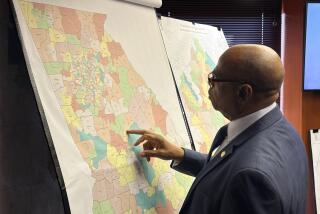In Georgia race for Senate seat, a battle over who can vote

The best chance for Senate Democrats to play offense this midterm election has always centered on Georgia and newcomer Michelle Nunn’s ability to turn out African American voters in a state whose demographics are rapidly shifting.
Nunn’s well known family name -- her father served Georgia as a senator for 24 years -- and centrist sensibilities have carried her far, making what was once a long-shot bid seem increasingly possible.
A series of polls this month have shown an extremely tight race, with several giving Nunn an ever-so-slight edge in the race against Republican candidate David Perdue, a former CEO who has slipped in part because of a record of having outsourced American manufacturing jobs. The two are seeking a seat being vacated by Republican Saxby Chambliss, who is retiring.
But with early voting underway in the Peach State, the Democrats’ get-out-the-vote effort has run into trouble over who will be eligible to vote.
The state’s NAACP and other groups have sued the Republican secretary of state, Brian Kemp, to expedite processing of more than 40,000 new voter registration applications. They say Kemp’s office is stalling the potential new voters.
Led by the nonpartisan New Georgia Project, the groups have registered upward of 135,000 black and other minority voters this year, a significant increase in potential ballots that could tip the vote toward Democrats.
The groups argued in court over the last several days that applications left in limbo could leave voters unable to vote.
“They’re determined to steal this election,” said Francys Johnson, the president of the NAACP Georgia state conference. “And we’re determined, before it’s stolen, to not let that happen.”
Kemp’s office rejected criticism that it is slow-walking the applications. Lawyers for the secretary of state argued his office had done its work and that most of the applications that had not been processed involved people whose names were already on the rolls.
The secretary of state has returned a smaller number of applications, 10,000, to county clerks for additional processing -- typically a request for one of the two preferred forms of ID, a driver’s license, which many poor, minority and younger voters may not have.
The registration drive certainly turned heads in Georgia. Like much of the South, the state has gone Republican in recent decades. But a declining white electorate and an influx of African Americans and other minorities have begun to shift the state’s political leanings.
Kemp has launched an investigation into the voter registration effort, subpoenaing the group’s records and determining that at least 50 applications were fraudulent. Others used the names of voters who had died, are felons or otherwise ineligible to vote. The group paid up to $14 an hour to workers registering voters.
Perdue’s campaign has said Georgia is no place for “Acorn-style” fraud -- a reference to the community organizing group whose voter-registration drives were the subject of highly publicized investigations led by conservatives after the 2008 election.
The NAACP’s Johnson said that a few dozen faulty applications this year, among the thousands collected for a pivotal election, is a record he’ll stand by.
“We tell our opponents they are on the wrong side of history,” Johnson said Friday. “This is a battle for the South ... and Georgia is quickly changing from red to purple, and we think, even to blue. That’s why they’re holding on to power.”
For the latest from Congress follow @LisaMascaro
More to Read
Get the L.A. Times Politics newsletter
Deeply reported insights into legislation, politics and policy from Sacramento, Washington and beyond. In your inbox three times per week.
You may occasionally receive promotional content from the Los Angeles Times.







